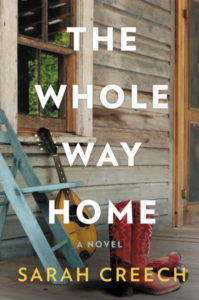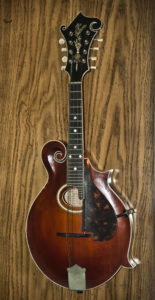 Triangular Love, Home, and Country Music (Nashville, present-day): The Whole Way Home sings like real country music. “A living heart in a song.” A “dance despite the heartaches.”
Triangular Love, Home, and Country Music (Nashville, present-day): The Whole Way Home sings like real country music. “A living heart in a song.” A “dance despite the heartaches.”
“Good country music” – in the straight-talking words of Floyd Masters, Sarah Creech’s old-time country music legend turned radio sage who graces our airwaves from Vanderbilt’s station, 87.3 FM – “should make you feel something, should cover the entire territory of the heart.” Creech’s second novel surely does with prose that’s strong, tender, achy, spirited, sorrowful, angry, wary, honest.
Are you one of the two million fans of the country music TV show Nashville longing to relive the romantic chemistries and musicality between three country music stars before they killed off the female character centering them? Well, dazzling indie singer/songwriter Rayna Jaymes – that “rebel woman,” that “good-values kind of woman” – is back as Jo Lover! As magnetic and torn between “two different kinds of love” as Rayna was.
This time around Nashville’s Deacon Claybourne, the fiery guitar-strumming character wrapped up in Rayna’s history, returns as J. D. Gunn, Jo’s Appalachian childhood soulmate who, along with his band brothers the Empty Shells, is now a “multiplatinum-selling country music megastar;” and Luke Wheeler, Rayna’s calmer, more conservative heartthrob is now Nick Sullivan. Privileged, yet he earned his reputation as the “most sought after producer in Nashville, maybe in the entire music industry – he could play bass, guitar, pedal steel, accordion, harp, mandolin, piano, percussion, horns.”
J. D. is from Jo’s past: she hasn’t seen him in five years. Nick is her future. Until things change, in Chapter 1, The Wrong Chord.
That’s when country music’s latest inductee into the Grand Old Opry – Jo – walks onto the stage of the “mother church of country music,” the Ryman Auditorium, and becomes so unnerved seeing J. D. she misses an easy chord. Noticeable to anyone who knows the music.
Picture the set-up: Imagine Jo as a “young Emmylou Harris” (long black hair, tall, slender), strutting her signature red Ariat cowgirl boots, singing in her “trembling, lilting, Southern-accented voice.” She’s thirty-two, from a small mountain town in fictional Gatesville, Virginia, where “mountains and music make memories.” Her female fans – the ones she writes for – are screaming for her “mountain-girl style,” for the sweet sounds of her fiddle and mandolin, for her healing music.

1916 Gibson F-4 Mandolin
By Anita Ritenour (Flickr: Gibson Mandolin) [CC BY 2.0], via Wikimedia Commons
Observe she’s not a folksy Jo when she steps onto that historic stage all made-up in her hot dress and even hotter seven-carat, Assher-cut diamond. She’s engaged to three-time Grammy winner Nick, whose father owns Asphalt Records, the indie label that’s nurtured her.
Look whose sitting in that wild-for-Jo audience! Jo didn’t expect to see him, but you can’t miss his Elvis-looks: black wavy hair and “blue eyes lit up with innocent joy like paper lanterns.” Their estrangement seems to be about Jo feeling he’s sold-out to a corporate label. Once poor as “pickup sticks,” but she hasn’t forgotten what “her mama always said … don’t get above your raising.” That musical mistake is the first sign something is still there between them. If only J. D. could get her to smile at him, “that look that always did him in like the full moon over the mountaintop.” But Jo loves Nick, he’s good for her; she wants no part of J. D. Right?
Romantic tension skips through the pages. Jo’s country music men deeply love her in their own ways, which is why the novel sings. It’s not until you’re halfway through that Jo and J.D.’s backstory becomes acutely clear; it’s not until the novel’s end that the romantic triangle reshapes to two.
Like Rayna and Deacon, Jo and J. D. have a past they can’t seem to get over. But Nick’s a really decent guy, lower-key, gracious, and he offers her a love that’s purer and safer. Like Rayna and Luke, Jo and Nick are to be married on his magnificent estate (in eyeshot of J. D.’s) in an over-the-top wedding scheduled around their tour dates.
Whomever you’re rooting for, whoever wins Jo’s uncertain heart, with the TV visuals and sounds running through your head, the whole reading experience is even more immersive and satisfying.
Connie and Deacon at the Bluebird Café
The plot does bubble with some “thinking like a businessman” bumping up against “thinking with his heart.” How else could this be a candid look inside the country music industry from the standpoint of the singer/songwriter/musician as well as the business executive’s?
The authentic thread continues with storylines about up-and-coming young talent like the Flyby Boys band, amplifying what it’s like to get noticed, picked up, make it in Nashville. It feels like the whole gamut: from the local “dive bar circuits” such as the imaginary Thirsty Baboon, to yearning for a gig at the legendary Bluebird Café where dreams can come true, to the heavy drinking and lusting on tour, to hearing your songs on the radio, to going viral, to the make-or-break publicity in Rolling Stone, Vanity Fair, American Songwriter, the tabloids, paparazzi, to 360 contracts, to the “post-Napster world” of digital streaming. The author’s research hums like she’s from this world.
The Whole Way Home also pays tribute to country music greats, names we all know and some we may not: Dolly Parton, Patsy Cline, Loretta Lynn, Tammy Wynette, Reba McEntire, Gillian Welch, Alison Kraus, Kitty Wells, Bessie Smith, Phil Dolby, Ernest Tubb, Waylon Jennings, Willie Nelson, Deford-Bailey, Charly Pride.
Don’t be fooled by the list of female artists or the sole black virtuoso who made it big. The author also doesn’t shy away from the industry’s prejudices. It’s far more profound than “country music was still a man’s world,” that it still sees women as “one-dimensional.” It doesn’t embrace a whole lot of diversity.
Racially, discrimination is illuminated in the stories of two black artists. The one that affects the plot the most involves Alan, a member of J. D’s band, who works at the Black Country Music Association, founded to address the inequities. He hails from the Bahamas but his “songs felt so true to country.” Creech invents contract deals to bring home the shame of racism, yet she imbues a moral conscience in her writing and has a poet’s way of easing the pain.
One of my favorite evocative lines recalls memories of Home, a major theme. Jo, as we’ve established, has ambivalent feelings about J. D. In one poignant scene, she:
“felt time fold in like an accordion. J. D. smelled like red clay earth, like composing leaves on the floor, like the honeysuckle vines and Confederate jasmine blooming in June, like wild roses growing on the side of the road and fresh honey from the hive and barn straw and his daddy’s cow pasture after a spring rain, like the metallic air before the storm. He smelled like home.”
Another moving scene takes place on stage, when Jo and J. D. are pressured to play together for the good of the record label. They choose an old song they wrote and sang a long time ago called “Glass Hearts.” It’s a beautiful title, one that epitomizes the novel. “Great songs don’t lose their power with age.” Neither should The Whole Way Home.
Lorraine
PS Could the novel’s release be timed any better? Tonight at 9PM on the cable channel CMT, Nashville returns with some new characters. Will they be as good as Creech’s?